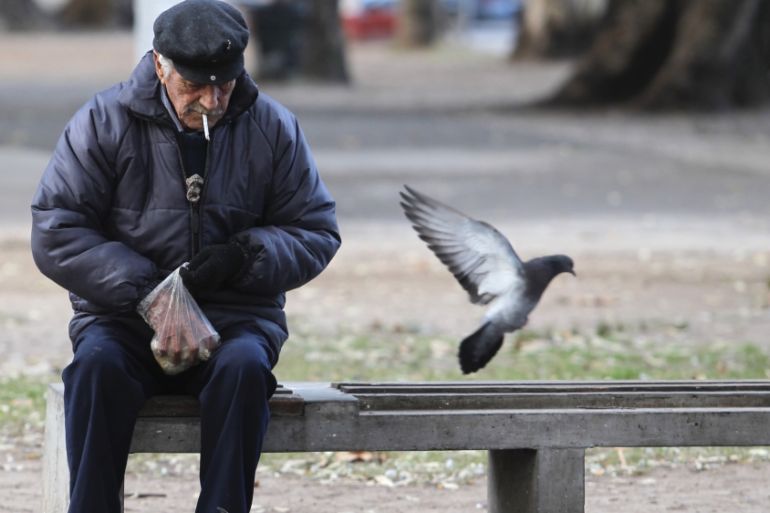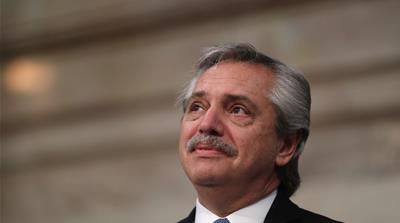Argentina tries to protect older people from COVID-19
An estimated 10,000 people in Argentina are 100 years old or older; they are especially vulnerable to coronavirus.

Silvia Romero inched backwards with her shopping cart on a muted Buenos Aires street, maintaining a spatial buffer of about a metre around her.
It was 8:30 Monday morning and the 68-year-old cook was out earlier than usual to avoid crowds and beat the run on goods that has gripped the city.
Keep reading
list of 4 itemsMexico’s teachers seek relief from pandemic-era spike in school robberies
‘A bad chapter’: Tracing the origins of Ecuador’s rise in gang violence
Why is the US economy so resilient?
Romero is part of a demographic to which the Argentine government is paying special attention as the tally of COVID-19 infections climbs daily in the nation.
On Monday, the number of COVID-19 cases in South American country grew by nine. As of Monday, 65 people including one person who is a healthcare worker have confirmed infections.
“To the people who are over 65 years old, we’re asking them to stay home, where it’s calm, to enjoy their homes,” Argentine President Alberto Fernandez said Sunday night at a news conference, underscoring the advice of medical experts that older people may suffer more serious consequences from the coronavirus.

The government announced this week that anyone over the age of 60, save for healthcare workers, is entitled to take paid leave from their jobs. Fernandez also said specific hours of attention would be set aside for them at banks, medical centres, and other services, so they can “go on with their lives” in the midst of the health crisis. Grocery stores had already started opening earlier for people over 65, while banks have adjusted rules around what retirees have to do to continue being able to claim their pensions.
“Whatever else they need, so they don’t have to deal with lines, and most importantly, so they don’t have to be in crowded spaces where they might be infected,” said the president.
Ramping up response
Latin America is one of the regions with the least number of reported cases of COVID-19. It recorded the arrival of the coronavirus later than other parts of the world. But infections have been growing markedly. Countries, including Argentina, have responded by closing borders, ordering quarantines, and imposing a host of restrictions designed to keep people home and thereby slow the spread of the disease. The Argentine government is also charging any person who violates their obligatory isolation with a crime. On Monday, it added neighbouring Chile and Brazil to its list of countries that pose a coronavirus risk.
Scientists believe COVID-19 originated in China late last year. The disease has claimed more than 7,000 lives globally. The World Health Organization (WHO) declared the outbreak a pandemic last week, and says the epicentre has shifted to Europe, with Italy reporting 2,158 deaths.
Argentina’s first case was announced on March 3. Among the 65 cases, are two deaths – men, in their sixties, with pre-existing medical conditions, one of whom had been to France and the other to Germany, Turkey, and Egypt. So far, there is no record of “community transmission” in Argentina, as has occurred elsewhere. That is when the virus is circulating so widely, it is impossible to say how one became infected.
“We have to consider that what happened in other countries will happen here, too,” Dr Ricardo Teijeiro, a member of the Argentine Society of Infectology, told Al Jazeera. “We hope that it’s a lot slower. That’s the move we’re making – that the virus will not evolve so brusquely, but theoretically, yes, we will start to see more new cases,” he said.
Officials point to an older population, and strong links to Europe, in particular Italy, where many Argentines trace ancestry and have family, as worrying factors. Most of Argentina’s confirmed cases of COVID-19 are of travellers returning from abroad, mainly Europe.
“The situation in Italy changed the degree of risk for Argentina,” Dr Mirta Roses, an epidemiologist and the WHO’s special coronavirus envoy in Latin America and the Caribbean, said at a news conference in Buenos Aires last week. In addition, she estimated there are approximately 10,000 people who are 100 years old or older in Argentina. “We have a population that lives long, but a lot of them with caregivers or family that travel abroad, or with family who come to visit from abroad,” she said.
Changing social habits
Teijeiro said it is social habits that will affect the evolution of an epidemic. And that is why officials are trying to get the message out – so that people change behaviours now. In Argentina, for example, it is common to kiss everyone on the cheek in greeting, or to share the metallic straw of the traditional infusion known as mate.
“Those behaviours are hard to change. We are seeing that a lot of people are listening to us, and they’re changing. But there’s still a lot of people who are not assuming the responsibility,” said Teijeiro, who said people over 65 should stay home as much as possible, and avoid groups or busy indoor establishments. Pregnant women and people with other ailments have also been granted leaves from work.
Activity is notably down in the capital city of Buenos Aires. Restaurants and stores sit empty. Many small business owners, who are struggling already in the midst of a continuing recession, say they cannot afford to close – like 66-year-old Silvia Bonda, who owns a lighting shop with her husband on Santa Fe Avenue. She counts herself lucky because she does not have employees to pay.
Our healthcare system is not like the ones in more developed countries. If we had a problem that is one-quarter of what Italy is facing today, we'd be in serious trouble.
“I keep working; otherwise I’m going to die,” Enrique Somonte, a 74-year-old who was slated to pick up Spanish fishermen on Sunday from Ezeiza international airport, near Buenos Aire. They did not arrive. “With my monthly pension of 11,000 pesos [$175], how am I supposed to survive,” said Samonte, as he took a smoke break outside the airport, his face mask pulled below his chin.
Gustavo Iraola, a 64-year-old businessman from the city of Bahia Blanca, said he plans to stay in his home. “No one can fathom how this is going to end, so there aren’t any exaggerated measures,” he said. “I think the main player in this game is the citizen. It’s not science, or vaccines, or government regulations.”
Dr Carlos Luna, former president of the Argentine Association of Respiratory Medicine, applauded the government’s recent approach but is still worried.
“I’m not sure that these measures will reduce the final size of the pandemic in Argentina, but I do think it will help lower the peak of incidents, and that’s very important,” he told Al Jazeera.
“Our healthcare system is not like the ones in more developed countries. If we had a problem that is one-quarter of what Italy is facing today, we’d be in serious trouble.”